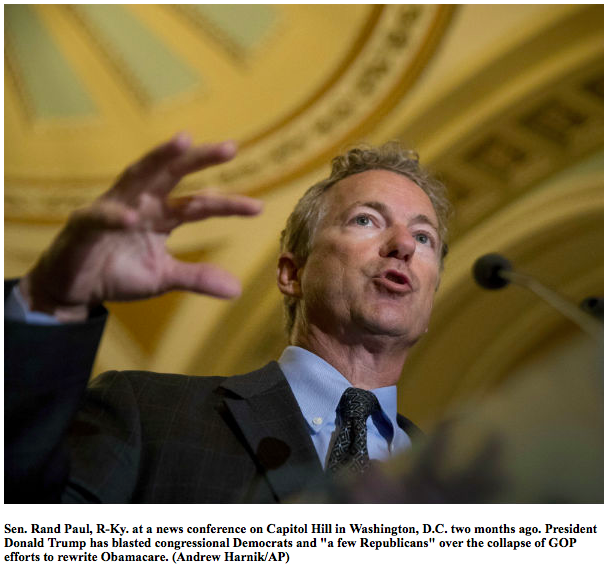Everyone Wins When Consumers Can Truly Shop for Healthcare
 The following article is part two of a series.
The following article is part two of a series.
Health insurance as it’s presently used adds to heathcare costs.
The Affordable Care Act (ACA) shifted those costs into overdrive. A single-payer system would send them into the stratosphere resulting in rationed healthcare.
So what’s the answer? One solution has been set into play already by those most intimately aware of the problem — healthcare professionals.
Doctors revolt
Physicians around the country are forming Direct Primary Care practices in response to America’s healthcare crisis. They don’t accept insurance in any form — government or private. Instead, in return for set fees, they provide medical services for their patients.
Family practitioner Dr. Josh Umbehr opened one such practice — AtlasMD — in Wichita, Kansas, and charges a reasonable monthly fee in return for unlimited routine medical care — including house calls.
Umbehr wrote on his website, "AtlasMD represents my ideal medical practice wherein I am able to shrug off the burdens and restrictions of government and insurance regulation so that I may focus solely on my patients and their needs."
And by shrugging off those "burdens and restrictions," Umbehr is able to offer patients quality healthcare at a lower cost. He described the concept for The Objective Standard, "In a standard model, a doctor would have seven to ten employees per physician — largely to process the insurance claims. With our model, we’re able to reach an efficiency that allows us to have one staff member — one registered nurse — per three physicians. So right there we’re able to pass along enormous savings to the patient."
This approach frees insurance for truly unexpected and catastrophic events for which insurance of all types — auto, home, etc. — was intended. This, in turn, lowers premium costs.
Other insurance savings
Allowing individuals to shop for policies across state lines would reduce premiums by increasing competition. This would require repealing the McCarran-Ferguson Act, a 1945 law placing regulation of insurance companies under the purview of the individual states.
Giving individuals the same tax advantages when purchasing health insurance that businesses have when providing it to their employees would also make it more affordable.
Allowing people to band together as an association to purchase group insurance policies would spread the risk to the companies and lower premiums.
Lowering healthcare costs
We’ve all heard of plaintiffs being awarded outrageous sums after filing frivolous lawsuits. A few states — notably Texas and California — have enacted tort reform to combat this trend, lowering caregivers’ malpractice insurance costs that can then be passed on to their patients.
In addition, expand the use of Health Savings Accounts, which are tax-advantaged medical savings plans. Congress should eliminate all caps on amounts that can be deposited into the plans, allow people to contribute tax-free to the HSAs of relatives and allow the plans to be bequeathed to other HSAs upon death.
Sen. Rand Paul, R-Ky., a huge proponent of HSAs, would eliminate any requirement that they be tied to a high-deductible insurance plan. The Kentucky senator recently asked, "What if 30 percent of the public had health savings accounts?" He added, "What do you do when you use your own money? You call up doctors and ask the price. . . . If you create a real marketplace, you drive prices down."
And speaking of creating "a real marketplace," encourage physicians to post a fee schedule for standard services, promoting competition among caregivers.
Medicaid / Medicare savings:
Changes in Medicaid state block grants may be in the works, courtesy of Seema Verma, President Donald Trump’s pick to run the Centers for Medicare and Medicaid Services (CMS). She’s the architect of the Healthy Indiana Medicaid program.
It gives recipients some skin in the game by making them take some responsibility for their own health care. NPR recently reported, "Beneficiaries make monthly payments from $1 to about $27 into individual health savings accounts, and the state also contributes. That money can be used for doctor visits and prescriptions. If beneficiaries get vaccines and other preventive care, they get a discount on their premiums the following year."
Additional carrots and sticks are also employed by the system.
Verma testified at a congressional hearing in 2013, "The Medicaid program has not kept pace with the modern healthcare market." Verma added, "Its rigid, complex rules designed to protect enrollees have also created an intractable program that does not foster efficiency, quality or personal responsibility."
Much more can be done to combat waste, fraud, and abuse within both Medicaid and Medicare.
Medical Services Administrator Marion S. Frank told a recent South Florida Tea Party gathering, "When a doctor or hospital files a claim to Medicare or even Medicaid, it is sent electronically," adding, "No human reviews the paperwork to see if it is accurate or if the patient even has the insurance they say they have. The contracted amount of money is just electronically deposited into the providers account."
Conclusion
Congress can’t magically control one-sixth of the economy. It’s too complex and introducing government in the mix only makes it more so. The best Congress can do is to get out of the healthcare altogether. Last July, Republican senators had an opportunity to repeal Obamacare outright. They blew it.
Let’s hope they get something people are rarely given — a second chance.
Michael Dorstewitz is a retired lawyer and has been a frequent contributor to BizPac Review and Liberty Unyielding. He’s also a former U.S. Merchant Marine officer and an enthusiastic Second Amendment supporter, who can often be found honing his skills at the range. To read more of his reports — Click Here Now.
Posts by Michael Dorstewitz
Source:https://www.newsmax.com/MichaelDorstewitz/atlasmd-cms-hsa-mccarran-ferguson/2017/09/19/id/814535/









